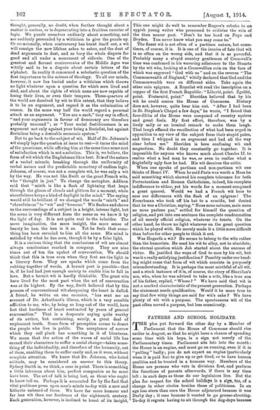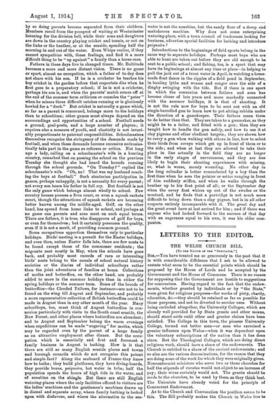FATHERS AND SCHOOL HOLIDAYS.
THE plea put forward the other day by a Member of Parliament that the House of Commons should rise earlier in August, so that he might have a chance of spending some time with his boys, is a sign not merely of the Parliamentary times. Parliament sits late into the month : the House is an engine, and must go on running, even if it is " pulling " badly; you do not expect an engine (particularly when it is paid for) to give up or get tired, or to have human qualities and be treated in a humane way. Members of the House are persons who vote in divisions first, and perform the functions of parents afterwards, if there is any time left : in such days as these do our legislators live. But the plea for respect for the school holidays is a sign, too, of a change in other circles besides those of politicians. In an age less stern than ours the House adjourned because it was Derby day ; it rose because it wanted to go grouse-shooting. To-day it regrets having-to sit through the dog-days because
by so doing parents become separated from their children. Members recoil from the prospect of waiting at Westminster listening for the division bell, while their sons and daughters are down in the country playing cricket and tennis, or out on the links or the heather, or at the seaside, spending half the morning in and out of the water. Even Whips realize, if they cannot sympathize with, these feelings, and find it a more difficult thing to be " up against" a family than a horse-race.
Fathers in these days live in changed times. Mr. Bultitude becomes a more and more distant vision. There is no game or sport, almost no occupation, which a father of to-day does not share with his son. If he is a cricketer he teaches his boy cricket in the garden before that exspeetesta dies when he first goes to a preparatory school; if he is not a cricketer, perhaps his son is, and when the parents' match comes off at the end of the summer term criticizes or consoles the " pater " when he misses three difficult catches running or is gloriously bowled for a " duck." But cricket is naturally a game which, so far as a parent is concerned, belongs more to the holidays than to schooltime; other games must always depend on the surroundings and opportunities of a schooL Football needs a ground, goal-posts, and a large number of players ; it requires also a measure of youth, and elasticity is not invari- ably proportionate to paternal responsibilities. Schoolmasters themselves recognize the stringency of the demands made by football, and when these demands become excessive enthusias- tically take part in the game as referees or critics. Not long ago a lady, calling on a schoolmaster's wife in a hunting country, remarked that on passing the school on the previous Tuesday she thought she had heard the hounds running through the school grounds. " On Tuesday?" replied the schoolmaster's wife. " Ob, no ! That was my husband coach- ing the boys at football." Such stentorian participation in games, perhaps unhappily, is not a necessity for every parent; not every son hears his father in full cry. But football is not the only game which belongs almost wholly to school. Few country houses possess a fives court, or even a squash rackets court, though the attractions of squash rackets are becoming better known among the middle-aged. Golf, on the other hand, has spread from home links to school, and perhaps at no game can parents and sons meet on such equal terms. There are fathers, it is true, who disapprove of golf for boys, or even for themselves ; but it certainly possesses the quality, even if it is not a merit, of providing common ground.
Some occupations apportion themselves only to particular holidays. Birds'-nesting is a pursuit for the Easter holidays, and even then, unless Easter falls late, there are few nests to be found except those of the commoner residents ; the migrants nest mostly in May, when the schools have gone back, and probably most records of rare or interesting birds' nests belong to the annals of school natural history societies or the diaries of individual schoolboys rather than the joint adventures of families at home. Collections of moths and butterflies, on the other hand, are probably added to more in the summer holidays than in either the spring holidays or the summer term. Some of the broods of butterflies—the Clouded Yellows, for instance—are not to be found on the wing till August and September, and probably a more representative collection of British butterflies could be made in August than in any other month of the year. Many schoolboys, too, must think of August butterflies in con- nexion particularly with visits to the South coast seaside, the New Forest, and other places where butterflies are abundant; and to August and September belong the warm evenings when expeditions can be made " sugaring " for moths, which may be regarded even by the parent of a large family as an attractive employment after dinner. But the occu- pation which is essentially and first and foremost a family business in August is bathing. How is it that there are still so many English seaside places and towns and borough councils which do not recognize this patent and simple fact? Along the seaboard of France they know how to bathe; they build platforms, they have diving-boards, they provide boxes, peignoirs, hot water in tubs; half the population spends the hours of high tide in the water, and of sunshine on the shingle. But there are still English watering-places where the only facilities offered to visitors are the ladies' machines and the gentlemen's machines drawn up in dismal and separate array, where family bathing is looked upon with disfavour, and where the alternative to the sea-
water is not the sunshine, but the sandy floor of a damp and malodorous machine. Why does not some enterprising watering-place, with a town council of tradesmen looking for business, advertise special facilities for bathing and introduce peignoirs 7 Introductions to the beginnings of field sports belong in the same way to separate holidays. Perhaps most boys who are able to hunt are taken out before they are old enough to be sent to a public school ; and fishing, too, is a sport that may have its beginnings at almost any time or place—in helping to pull the jack out of a trout water in April, in watching a home- made float dance in the ripples of a field pond in September, in hauling lythe and wrasse and conger over the side of a dinghy swinging with the tide. But if there is one sport in which the connexion between fathers and sons has become closer of late years and more markedly connected with the summer holidays, it is that of shooting. It is not the rule now for boys to be sent out with an old single-barrelled gun to learn how to pot sitting rabbits under the direction of a gamekeeper. Their fathers mean them to do better than that. They are taken to a gunmaker, as they might be to a tailor, and fitted with a gun ; then they are taught how to handle the gun safely, and how to use it at clay pigeons and other obedient targets ; they are shown how to carry a gun when walking with others in line, how to select their birds from coveys which get up in front of them or to the side; and when at last they are allowed to take their place in line actually in the field they are no longer in the early stages of nervousness, and they are less likely to begin their shooting experiences with missing, or, what is worse, merely wounding. No other day in the long calendar is better remembered by a boy than the first time when he sees the pointer or setter ranging in front of him suddenly stiffen, and when he walks through the heather up to his first point of all; or the September day when the covey first whirrs up out of the swedes or the mustard, and he finds that a partridge is not much more difficult to bring down than a clay pigeon, but is in all other respects entirely incomparable with it. The great day and the great event have at last arrived for him ; and if there was anyone who had looked forward to the success of that day with an eagerness equal to his own, it was his older com- panion.



































 Previous page
Previous page